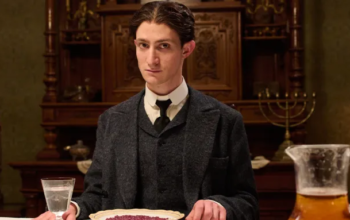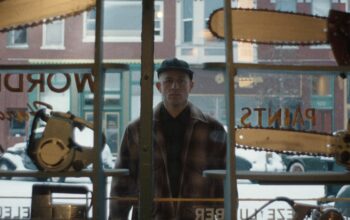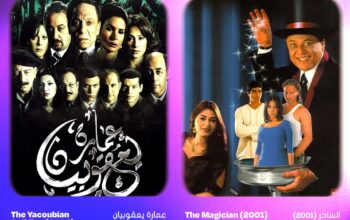The first season of The Paper, Peacock‘s sorta kinda demi-spinoff of NBC’s The Office, is better than the first season of that show or the first season of NBC’s Parks and Recreation, which started its own creative life as a sorta kinda demi-spinoff of The Office before it became merely a stylistic and spiritual companion.
This is one of those things that sounds like a big deal if you put it on a billboard — “The Paper Is Better Than The Office or Parks and Recreation!”. But it is, ultimately, a reminder that The Office launched with a bumpy first season that struggled to blend new episodes and ill-fated remakes of the beloved BBC series before finding its own unique rhythms, while Parks and Recreation underwent one of TV’s all-time great transformations from a six-episode opening run of clunkers to a near-perfect second season.
The Paper, created by Greg Daniels and Michael Koman, settles into its voice swiftly. Echoing, if not reproducing, the elements that made The Office such a venerable success, The Paper is quick to capitalize on the strengths of its impressive ensemble and to mine the versatility of its fresh workplace, delivering a 10-episode initial run that is frequently funny, occasionally pointed and, more than anything, consistent. (Peacock has already renewed the series.)
After a strained and generally unfunny introduction that loosely connects The Office to the new series, The Paper takes us to Toledo and the offices of the Toledo Truth-Teller. It’s a once-proud regional newspaper, itself the subject of a ’70s Maysles/Wiseman-style documentary (in clips featuring Tracy Letts), fallen on hard times.
Today, the Truth-Teller shares office space with a toilet paper company. Interim managing editor Esmeralda Grand (Sabrina Impacciatore) has mastered the art of Buzzfeed-style clickbait content for the website, TTTOnline, while the print edition is stumbling along with only a pair of reporters: Stars & Stripes veteran Mare Pritti (Chelsea Frei), who yearns to do journalism but mostly pulls stories off of the wire; and aging Barry (Duane R. Shepard Sr.), who yearns to nap.
Non-editorial staff include Nicole (Ramona Young) in circulation, Detrick (Melvin Gregg) in ad sales, and a robust accounting department featuring Adelola (Gbemisola Ikumelo), Adam (Alex Edelman) and Oscar (Oscar Nunez). Yes, The Office fans, THAT Oscar, very much chagrinned to find himself followed by a documentary crew again.
Ned (Domhnall Gleeson), who set aside youthful journalistic dreams to become a superstar toilet paper salesman, arrives at the Truth-Teller elevated all the way to editor-in-chief and immediately clashes with Esmeralda and sniveling corporate middle-man Ken (Tim Keys).
Determined to revitalize the paper, but without any financial resources to speak of, Ned invites the paper’s staff, plus any interested parties from the toilet paper company, to serve as volunteer writers.
You’ll notice several problems off the top. By treating the paper business as antiquated and doomed, The Office probably offended some people in that industry, one that’s less capable of turning that irritation into platformed discontent like a passel of ink-stained wretches. So The Paper treats journalism as aspirational — Ned describes over-romanticizing as one of his main faults. But in a business on real-world life support, how idealistic is it to suggest that it’s a job that can be done by volunteers? So, after the pilot, The Paper glosses over the “volunteer” part of its plot, briefly acknowledging several ethical bugaboos before returning to its Bad News Bears — emphasis on “news” — underdog story. If you have a premise you have to run away from, that isn’t ideal.
Could this story be told without Oscar? Completely, which isn’t a great sign either. Other than the prickly familiarity of his interactions with the documentary crew, Oscar is least funny when he’s being most directly referential to the original series, when he’s referring to his conversations with Stanley or directly quoting Michael Scott quoting Michael Jordan.
What Oscar allows, I suppose, is for The Paper‘s nods to The Office to feel like homage and not theft. It’s the difference, in Star Wars terms, between J.J. Abrams’ The Force Awakens and Zack Snyder’s Rebel Moon. The former was saluted for giving fans what they wanted within a familiar and comforting genre universe and the latter was accused of ripping off that genre universe. The Paper panders, but it panders with affection.
The Paper can’t just write The Office and call it something new, but it can be savvily aware of the things that worked on The Office and supply them to viewers directly and with variations to see what sticks. None of the characters has a precise Office counterpart, but there are ample adjacencies, with Ned coming across as privileged and cheery in a way that recalls Ed Helms’ Andy; Ken and Esmeralda taking several of Michael Scott’s worst traits; Barry offering hints of Creed, etc. If the slow-burn romances between Jim and Pam and, eventually, Dwight and Angela gave the original series heart, The Paper establishes several workplace pairings immediately and plainly, accelerating their advancement.
Formally, the all-star team of mockumentary-trained directors — from Daniels to Ken Kwapis to Yana Gorskaya to Jason Woliner to Jeffrey Blitz — makes effective use of the nonfiction aesthetic, maintaining jittery energy whether episodes are contained entirely within the ultra-familiar office environment or venture out into a washed-out version of the Midwest. Plotlines generally involve a story or two that our intrepid near-volunteers are pursuing, including a serial catfisher who targets Esmeralda, a regional farm that may also be a cult and Ned’s rivalry with a local high school blogger. A finale that echoes in several ways the iconic “Casino Night” episode of The Office offers a reminder that these 10 episodes burn through several seasons of ideal narrative and character arcs.









